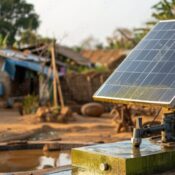
Beyond Security: How Solar Panels are Fueling Sustainable Development
In the pursuit of a more sustainable future, the adoption of renewable energy sources has emerged as a crucial component of global efforts to combat climate change and promote sustainable development. Among these sources, solar energy stands out as a versatile and accessible solution with far-reaching benefits beyond mere security. In this blog post, we will explore the multifaceted impact of solar panels on sustainable development, including their role in driving economic growth, expanding education opportunities, protecting the environment, and fostering community resilience.
Solar Energy Access and Economic Growth
Access to reliable and affordable energy is fundamental to economic development, particularly in underserved communities where traditional energy sources may be unreliable or prohibitively expensive. Solar panels offer a decentralized energy solution that can be deployed in remote areas, empowering communities to develop local economies and create new opportunities for growth.
Communities around the world are harnessing the power of solar energy to power schools, clinics, and small businesses, unlocking new pathways for economic prosperity. For example, a village in rural Africa that previously relied on costly and unreliable diesel generators for electricity installed solar panels, reducing energy costs and enabling local entrepreneurs to establish businesses such as phone charging stations and refrigeration services.
Education Opportunities and Environmental Protection
Beyond economic benefits, solar panels are also driving positive changes in education and environmental sustainability. In regions where access to electricity is limited, solar-powered schools provide students with a conducive learning environment equipped with modern amenities such as lighting, computers, and internet connectivity. This access to education not only empowers individuals but also strengthens communities and contributes to long-term development.
Furthermore, the transition to solar energy helps mitigate the environmental impact of traditional energy sources by reducing carbon emissions and dependence on fossil fuels. Solar panels produce clean, renewable energy with minimal environmental footprint, making them a critical tool in the fight against climate change and environmental degradation.
The widespread adoption of solar panels for sustainable development requires collaboration between governments, non-profit organizations, businesses, and local communities. Renewable energy organizations play a vital role in facilitating these partnerships, providing technical expertise, financing options, and capacity-building support to communities seeking to transition to solar energy.
As advocates for sustainable development, we have a responsibility to promote the adoption of solar solutions, advocate for government support for renewable energy policies, and encourage responsible energy consumption practices. By raising awareness about the benefits of solar energy, supporting initiatives that increase access to solar technology, and advocating for policies that prioritize renewable energy, we can collectively work towards a more sustainable and equitable future for all.
In conclusion, solar panels are more than just a source of energy—they are catalysts for sustainable development, driving economic growth, expanding education opportunities, protecting the environment, and fostering community resilience. Let us join forces to harness the power of the sun and build a brighter, more sustainable future for generations to come.



